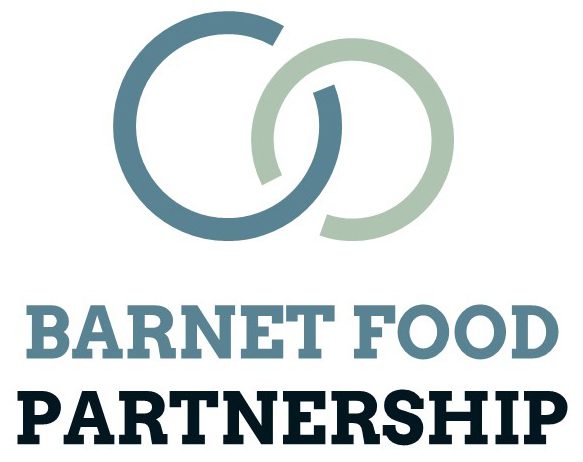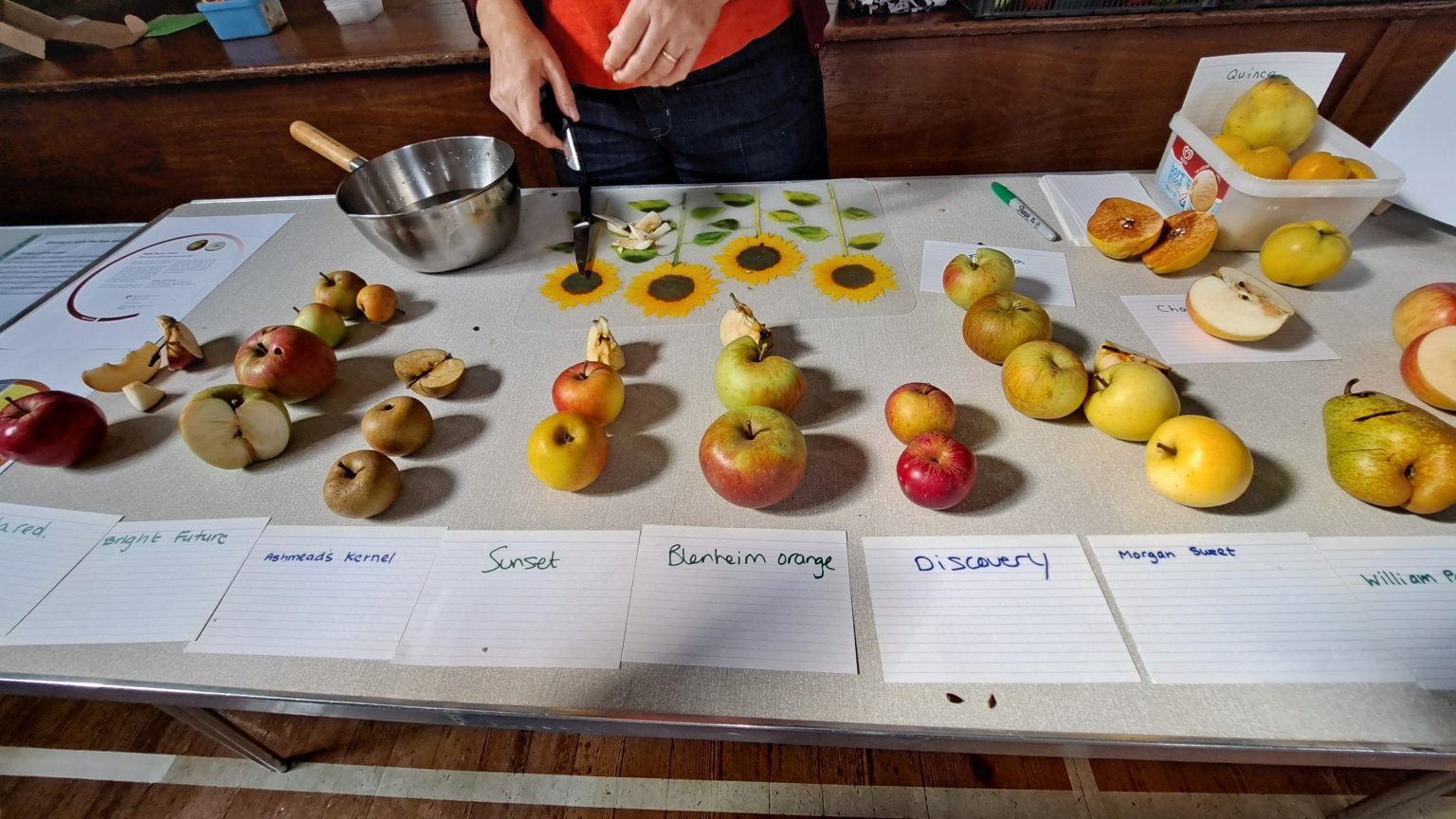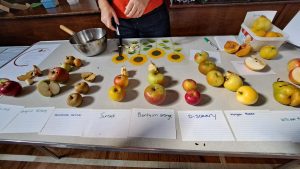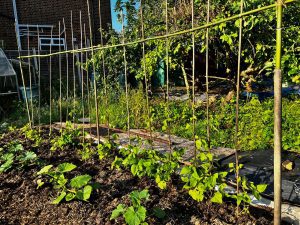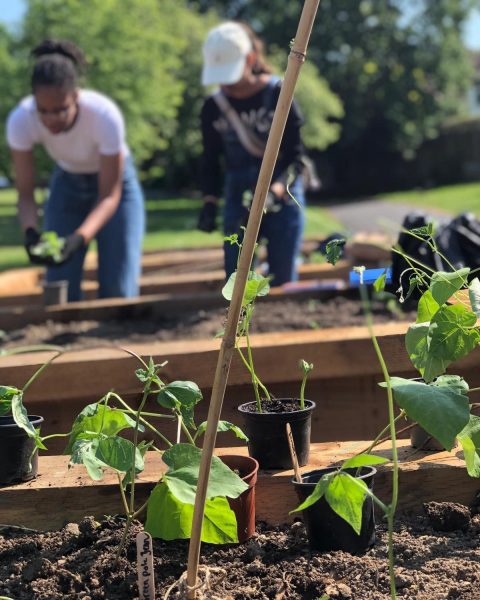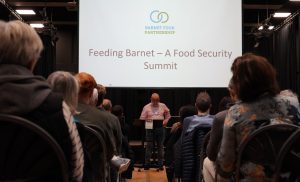An article by Dave Mc Cormick from Sensemaking CIC
Connecting our Community
On a warm Saturday morning in late September 2025, more than 60 people aged from under 6 to over 60 came together to celebrate everything appley.
Organised by Incredible Edible Barnet, the event, held at the St John’s United Reformed Church community garden in New Barnet, included apple pressing, apple tasting, apple talks, apple cake and bug hunts to check out our pollinating insects without which we would have no apples, pears and other fruits.
We are what we eat
Celebrating apples brought back happy apple memories – often about childhood and family.
“When I was little, my Great Aunt would collect cooking apples from the garden and make apple pies with cloves in for us all – I remember picking them out of my mouth and thinking they were weird.”
“Mum would quarter apples and take the pips out and make me eat them (the apples not the pips).”
“My Mum made lovely Eves Pudding – a Victoria sponge cake with apples.”
“My Dad gives me bags full of Bramleys every Autumn which my family work our way through – we eat apples for weeks on end!”
“With my son and mother, washing, cutting out the bad bits and pressing using a home made press using a car jack.”
“Apples make me think of my great grandmother’s apple cake and my mum’s apple crumble. My dad now makes apple cider.”
“I remember my mum’s apple pie and custard which we would have on a Sunday. Also going scrumping in the vicarage garden of our Church. Unbeknown to us we were spied upon by the Vicar’s wife! Fortunately, she found it very amusing but were we embarrassed? Oh yes!”
“Earliest memories are of helping my mum to make apple butter with the discovery apple as from my garden. It was a lovely old tree because the area in Enfield was an orchard before the houses were built in the 1930s.”
“My parents garden (in Barnet next door to the Incredible Edible community garden) had an apple tree and my task was to harvest the apples then wrap them in newspaper and box them up to be kept in the garage (they would last months). My mum made lovely baked apples (cored cooking apple filled with a mix of dried fruit/ground ginger/allspice and brown sugar then baked in the oven).”
“My mum put mincemeat in the baked apples.”
Apple recipe suggestions
- Apple Butter – https://www.bbc.co.uk/food/recipes/apple_butter_53249
- Apple Cake – https://www.bbc.co.uk/food/recipes/dorset_apple_cake_3780
- Apple Crumble – https://www.bbc.co.uk/food/recipes/applecrumble_2971
- Apple Pie – https://www.bbc.co.uk/food/recipes/perfect_apple_pie_73735
- Baked Apples – https://www.bbc.co.uk/food/recipes/easy_baked_apples_with_65172
- Eve’s Pudding – https://www.bbc.co.uk/food/recipes/evespudding_83911
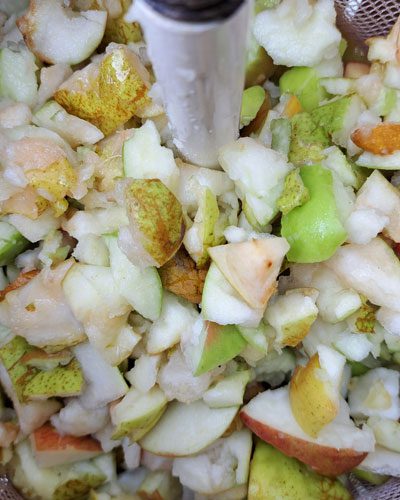
Apples have superpowers that make them good for our health and for the health of the environment.
Healthy People
Apples are a very healthy food being high in vitamin C, B-6, riboflavin, thiamin and disease-fighting antioxidants and phytonutrients. They contain no fat, sodium or cholesterol and are a good source of fibre. They also offer good levels of minerals such as calcium, potassium and phosphorus.
Consuming apples regularly may reduce the risk of type 2 diabetes, heart disease, and certain cancers, while also aiding in weight management due to their high fibre and water content which promote fullness. The skin of the apple is particularly rich in these protective compounds, making it beneficial to eat the whole fruit.
Healthy Nature
Apple trees absorb carbon dioxide, promote soil stability and reduce erosion, provide a habitat for various wildlife species, and offer a local food source for people and animals. For a good crop, apples need pollen from a different cultivar (type of apple tree) that blossoms at the same time. The blossom attracts pollinators (often bees) to move the pollen from one flower to another.
Planting apple trees can contribute to a more sustainable, local food system, reducing the need for long-distance transportation of fruit – reducing costs and environmental impacts.
Apple trees can help filter pollutants from the air, help with storm water management and reduce flooding in urban areas.
How Apples Conquered the World
From wild to cultivated apples
The ancestor of cultivated apples is Malus sieversii, a wild apple from Kazakhstan. The name Almaty was previously recorded as “Alma-Ata”, which translated as “Father of the Apples”.
Apple cultivation began 4,000 to 10,000 years ago in the mountains of Central Asia. The trees spread to Syria, then along the Silk Road. The Romans introduced apples to Britain, and eventually, European colonists brought them to North America, where figures like “Johnny Appleseed” helped spread apple trees widely.
Wild apples were abundant in China, and by 2023, China was responsible for 51% of world apple production. There are now over 7,500 cultivars of apples grown worldwide, including 2,100 English varieties.
Symbolism
Apples have symbolic meaning in many cultures and communities.
In ancient Greece and Rome, apples were sacred to goddesses of love. In Celtic mythology, they symbolized healing and wholeness. In Norse mythology, apples appear as symbols of fertility.
In China, gifting apples is a way to wish peace and safety.
Dipping apples in honey is a Jewish tradition for Rosh Hashanah, symbolizing a sweet year ahead.
The proverb “An apple a day keeps the doctor away” originates from 19th-century Wales.
Giving a teacher an apple symbolizes appreciation and knowledge.
As American as Apple Pie?
A recipe for apple pie can be found in a 1381 work by Geoffrey Chaucer. In the 17th century, settlers took apple pie recipes to North America. As sugar became more available, apple pie evolved into the sweet dessert we know today.
From Kazakhstan to Barnet seems to have been an incredible (edible) apple journey. With our changing climate, apples may have a significant role to play helping keep us, and the natural environment, healthy.
